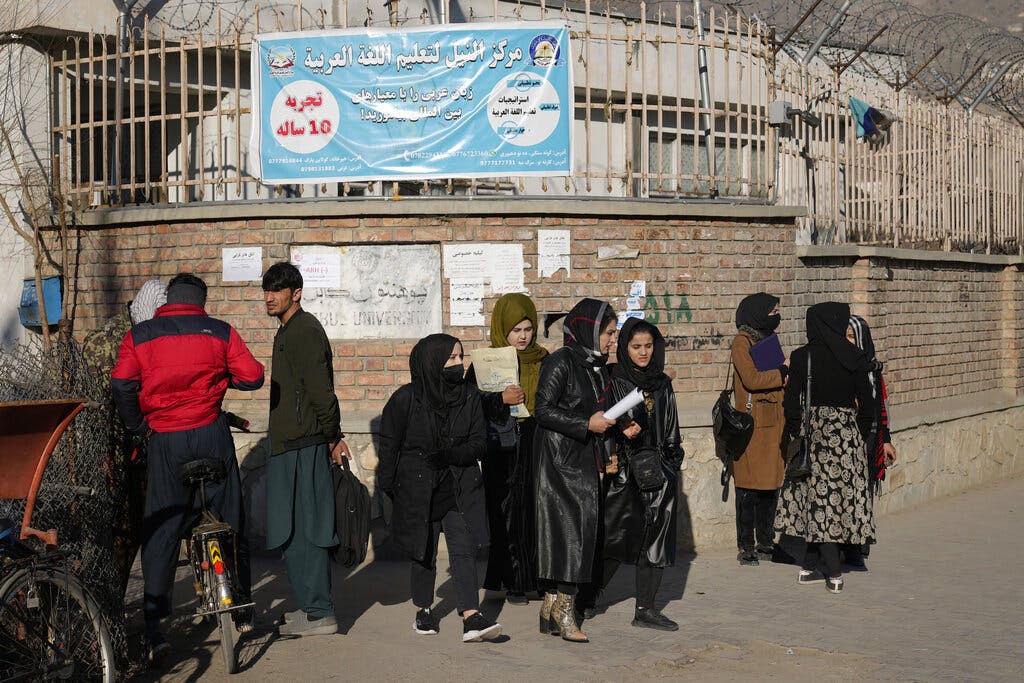With Latest Attack on Afghan Women, Taliban Nears Full Return to 1990s
There is nothing new about the so-called new Taliban that took over following America’s disastrous withdrawal from Afghanistan. Will a resumption of hosting international terrorists be next?

Armed soldiers preventing women from entering universities Wednesday provided new proof, not that any more was needed, that there is nothing new about the so-called new Taliban that took over following America’s disastrous withdrawal from Afghanistan. Will a resumption of hosting international terrorists be next?
In one of its most brazen recent acts, the Taliban on Tuesday announced a new law barring women from attending higher education institutes. That was followed by armed soldiers enforcing the decree, blocking female students, teachers, and employees — including cleaning women — from entering public and private universities.
Also on Wednesday, girls attempting to return to elementary schools were turned back. In a sharp reversal from the two decades in which an American-backed government held power at Kabul, women are now being forced to cover themselves head to toe while outdoors. They must be accompanied by males in all public spaces, and they are mostly barred from holding jobs.
At the universities, soldiers did allow some women to quickly enter campuses Wednesday to perform the administrative arrangements involved in terminating their positions there. To date, teaching has been one of the last professions available to women. No more.
Since last year’s hasty American withdrawal and the quick Taliban takeover, Afghanistan has gradually reverted to the social structure of the 1990s. At that time, the militant Sunni group used an iron fist to enforce its own interpretation of Sharia, or Islamic law. It also hosted what would become the most infamous world terrorist group, Al Qaeda.
Scant attention was paid to women’s rights in the formal agreements that preceded the August 2021 withdrawal that had left Afghanistan to the zealots. The 2020 pact signed by President Trump’s administration and the Taliban at Doha, Qatar, made no mention of it.
Instead, as both the Trump and Biden administrations were eager to “end endless wars,” they threatened the Taliban with action only if the terrorist groups returned to Afghanistan.
Nevertheless, a few days after images of last August’s disastrous withdrawal started filling television screens, President Biden said, “We’ll continue to speak out for the basic rights of the Afghan people — of women and girls — just as we speak out all over the world.”
Indeed, two weeks ago Mr. Biden’s Afghanistan point man, Thomas West, met with the son of the founder of Taliban regime, Mullah Yaqoob Mujahid, in the United Arab Emirates, where he stressed the need to maintain education rights for women.
By Tuesday an irate Secretary Blinken noted that no country other than Afghanistan bars women from receiving higher education. “The Taliban cannot expect to be a legitimate member of the international community until they respect the rights of all in Afghanistan,” he said.
In reality, Taliban representatives are already excluded from international institutions such as the United Nations and the International Monetary Fund. Ejection from “the international community” is an empty threat.
In Afghanistan, many think “America is intimidated and outright bullied by the Taliban,” a former member of the U.S. Armed Forces who is known as legend told the Sun. Asking for anonymity, as he often travels to the country, legend added that a “new generation of educated Afghan women who grew up learning the truth and hating the Taliban are now angry at America and call their oppressors ‘TaliBiden.’”
As is often the case when dealing with extremists, analysts attempt to discover nuances among them. “Unlike the 1990s, there appear to be different views inside the Taliban,” the UN Human Rights Council’s rapporteur in Afghanistan, Richard Bennett, told the British Broadcasting Corporation this morning.
The Associated Press quoted an Afghan political analyst, Ahmad Saeedi, as saying that the decision to shut women out of universities was likely made by a “handful” of senior Taliban figures, such the leader, Hibatullah Akhunzada, based at Kandahar, the birthplace of the Taliban movement, rather than by the Taliban-led government in Kabul.
Women attempting to gain an education in Afghanistan, however, care little about such nuances. Asked what the outside world can do, Mr. Bennett told the BBC, “The only tool the international community has is aid. And it’s not being used.”
Even worse, America’s monthly deliveries of tens of thousands of dollars in $100 bills to the Kabul airport have now been exposed by the Taliban’s central bank. As cash is the most common form of funds available in a country where the banking system has collapsed, it is the only way America can attempt to help alleviate Afghanistan’s dire humanitarian woes.
“All that money ends in the hands of the Taliban,” legend told the Sun. The National Resistance Front for Afghanistan’s head of foreign relations, Ali Maisam Nazary, added, “If today the cash is cut off, the Taliban is going to collapse.”
As of yet, even as Washington condemns this week’s education decree, it shies away from withholding any aid money as a way to influence the Taliban. It may reserve that option to prevent the fanatic Afghan group from reinviting international terrorists into the country, but by then it may be too late.

